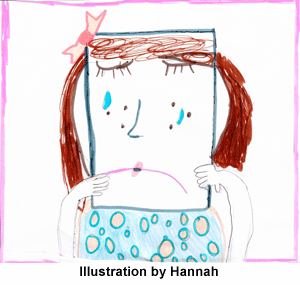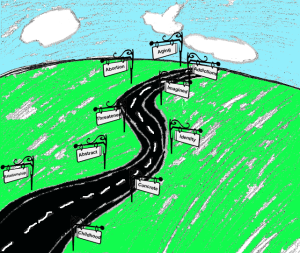 Last week, I began a series on The Grieving Process for Adults. Thus, for the next couple of weeks, I invite you to take a journey with me down The Highway of Life to view losses you might have encountered on your journey through life. It is my prayer that, not only will you receive emotional and spiritual healing from those losses, but it will enable you to help children when they experience a loss.
Last week, I began a series on The Grieving Process for Adults. Thus, for the next couple of weeks, I invite you to take a journey with me down The Highway of Life to view losses you might have encountered on your journey through life. It is my prayer that, not only will you receive emotional and spiritual healing from those losses, but it will enable you to help children when they experience a loss.
Let’s begin by defining Loss.
A loss is a separation from someone or something that has special value to us.
Every hurt is a result of a loss causing a broken heart.
Loss — A simple word that is one of our constant companions in life! However, many times we don’t recognize some losses as actual losses at the time they occur. Why? Most of us have equated the word “loss” primarily with the death of a loved one. As devastating as this can be, we encounter losses in many other areas of our lives.
Take a look down The Highway of Life and view losses you might have encountered along the way.
(Click on image for larger view)
Today, let’s take a closer look at the beginning of the highway where losses begin — Childhood Losses. Unfortunately for a lot of people, these losses have been stuffed way down deep inside and have traveled with them into adulthood. Just as Hannah has illustrated, there is still a little child within, hiding behind a mask, who is afraid to uncover them.
1. Children of divorce experience the loss of one of the parents on a full-time basis, family outings, and family holidays are disrupted. In some cases a move takes place, resulting in the loss of a home, friends, neighborhood, and school. When a parent dies, there is a sense of closure to the relationship. But with divorce, the child may live in a state of confusion, particularly if the non-custodial parent does not stay involved.
2. Physical Abuse is not only demeaning to a child, but causes the child to live in fear of when the next “lick” is coming. They become exhausted in their efforts to please, so as not to receive punishment.
3. Sexual Abuse literally robs children of their childhood and takes away their innocence. Some even feel an overwhelming sense of guilt that they were responsible for the act committed against them. As a result, they suffer in silence.
4. Verbal Abuse hammers away at a child’s self-esteem. “You’ll never amount to anything, you’re too fat, you’re not as pretty as your sister, and the list goes on.” Even excessive teasing can come across as ridicule. There is no truth in the old saying, “sticks and stones may break my bones, but not a word shall hurt me.”
5. Emotional Abandonment occurs when children grow up having all their physical needs met, but the missing elements that are so desperately needed — hugs, affirmation, and intimacy — are missing. The child feels alone, rejected, and abandoned.
6. Children of Alcoholics live with a loss of hope. They dream, as a child of an alcoholic described it, “of having a relationship with their alcoholic parent and having a real family.” The child lives with a sense of shame because he can’t talk about his family among friends. The child also, in most cases, loses their non-alcoholic parent because they are too busy taking care of the alcoholic parent. The parents can’t meet the child’s emotional needs because they can’t meet their own.
7. Rejection has its most rippling effects during childhood because children do not have the coping mechanisms needed to combat it. For example: A parent may seem to “favor” another sibling. Many a child has stood on the playground waiting to be chosen for a team, only to realize once again that he will be the last one chosen. The signal is, “You are not good enough.” Often the message of rejection says: “I don’t accept you because of your skin color, your clothes, or the way you look, such as you are too fat, too skinny, etc. Rejection results in feelings of intimidation, low self-esteem, feelings of inadequacy and contaminates every relation thereafter.
Shared Characteristics of All Childhood Losses
1. The sad part of many childhood losses is that the child often becomes introspective.
“What did I do wrong? It must have been my fault! There must be something wrong with me.”
2. Ungrieved losses in childhood interfere with an adult’s way of responding to life. Why? Because the losses in childhood are perceived with childlike wisdom, childlike knowledge, and child experience. As an adult there is still the loss down inside, but still understanding it and dealing with it as a child. As a result, adult losses are also handled with the same childish wisdom and knowledge.
3. One of the major obstacles that hinder young children and especially adult children from receiving help and healing with their childhood losses is a sense of loyalty. To disclose hurts from someone who is a close family member or friend comes with a feeling of betrayal. Many suffer in silence for years afraid of being disloyal.
In Matt.19:13, the children were brought to Jesus for Him to put his hands on them and pray, but the disciples turned them away. Jesus said, “Suffer little children, and forbid them not, to come unto me: for of such is the kingdom of heaven.” He then laid his hands on them and prayed.
My friends, Jesus wants to bless little children, and that’s who we are when we still have those childhood losses buried deep within us.

Are you ready to take the mask off today and start the grieving process of allowing Jesus to heal your broken heart? Your first step is naming the loss that is still causing you pain
Join Hannah and me right here next week, as we view Relationship Losses we encounter on The Highway of Life.










